In this episode, we talk about celebrating Indic birthdays so that children feel the joy and excitement of personalised connection with Hindu history and culture.
We converse with the founder of Janmatithi.com (also indicbirthday.com) to explore the differences between the Gregorian calendar and the Indic calendar. We also touch on the ways in which celebrating birthdays according to the Indic calendar will help us connect to Hindu dharma.
Show Notes
0:06 Why celebrate Indic birthdays
2:00: Vasco da Gama and the Indic calendar
5:00: The European calendar vs. the Indian calendar
11:30: How to use the website and find your Janmatithi
19:00: What is a tithi?
23:11: The Indic lunisolar calendar, the male and female energies of Shiva and Shakti, eco-feminism as a movement.
29:00: Indic calendar celebrations - the benefits and joy
32:00: Midnight celebration - how did it start? GMT vs the ancient Ujjain Meridian
34:24: What can a parent do everyday to enhance connection with the Indic calendar?
39:50: Listener question
General Information
Subscribers are requested to look for The Hindu Parenting notification emails for new podcasts/posts in their email promotions/spam tab and personally move these into the main inbox. Thereafter all posts will be delivered to their main inbox. Thank you!
For questions that you’d like us to address, please use the form below:
Hindu Parenting Questions
For comments and suggestions, please use the comments tab or write to us at contact@hinduparenting.org
Please note that questions will not be answered on email.
Do subscribe to our substack and follow us on our social media handles
Twitter: hinduparenting
Instagram: hinduparenting
Telegram: t.me/hinduparenting
Facebook: facebook.com/groups/hinduparenting
Transcript
[0:06] Rekha: Namaste. Welcome to the Hindu Parenting Podcast.
Today's topic is of particular interest to young parents and children. We are going to be talking of birthdays. Today we celebrate birthdays that sound like 21st December, or 3rd March. But as followers of Sanatana Dharma, we celebrate our gods and festivals on days that sound like Krishnaashtami, Ramanavami, Buddha Poornima, or Mahaveer Jayanti. So how do we reconcile these ways of arriving at birthdays and festivals? Was there a time when we used to calculate and refer to our birthdays differently? The question for us - do we know our Indic birthdays? Can we find our child's Janmatithi?
To help us understand the difference and tell us some interesting anecdotes along the way, Shalini and I will be talking to Suraj-ji, founder of Janmatithi.in or Indicbirthday.in. Namaste and welcome, Suraj-ji.
[1:11] Suraj: Namaste Rekha-ji. Namaste Shalini-ji, thank you for having me here. And thanks for hosting such a wonderful platform, especially for parents who are looking for a cultural connect for their kids.
Rekha: It's a pleasure to have you. Let's start with - why should we bother knowing our Indic birthdays? What is in it for us and our children?
[1:29] Suraj: Indeed. So, today if you go and ask any kid when is the birthday of Jesus Christ, he knows it immediately. He'll say it is December 25 from the top of his head, but ask the same kid, what is the birthday of Shri Rama or Shri Krishna? Do you know when they were born? They would not be sure about it, they will start scratching the head and wondering... they would not have an answer like...Sri Rama was born on Chaitra Navami and Krishna was born on Shravana Ashtami. These things are really a question mark for us. Why do kids not know this? One of the reasons is because we have lost our connect with the Indic calendar and the Indic calendar connects us with our culture. If we look back, even the ancient Indians, they excelled in astronomy, they devised astronomical calendar which is based on science and has undergone minimal change since millennia. If you look at the English calendar though, it is rather arbitrary, you know, it was not even standardized till 17th century. Only after 17th century they borrowed some techniques from India and synchronized their calendar.
So what was the need for our ancestors to devise such a advanced calendar at such an early age? It was primarily for navigation. Those days, Indians navigated across the world. And the complex calculations and accurate calculations were needed for this. In fact, there's a story that goes that, you know, Vasco de Gama discovered India as per our books, but the story goes that he couldn't have reached India but for the help he received from an Indian called Kanha! Vasco de Gama, when he came, he actually came only through the shores, he did not venture into deep sea. He came to Africa and then from there on, an Indian called Kanha actually navigated him along with his boats to India. So Vasco de Gama documents this, he says that he could see boats which are much larger than his boats. And also, he incidentally says that the person there was navigating us through his teeth. So this was very weird.
Shalini: What!
[4:00] Suraj: Yeah, so the story is very interesting. So the teeth actually represents - it's represented by a word called kau. A kau is what Kanha was referring to. And his reference was a polestar, this local dialect, he was using a device and he was measuring the altitude of the pole star from the horizon using a wooden board, and the thread was held by his teeth. So when Vasco de Gama saw this, he also heard the word kau and he had a memory of kau being used for teeth, the word kau being used for teeth as well. So he presumed there is some relation between teeth and navigation.
Shalini: How ridiculous!
[4:36] Suraj: While Kanha was going very advanced, he was looking at the pole star and he was measuring. So this kind of highlights the difference of understanding of the Indian perspective of astronomy and navigation, compared to that of a western mind. You know, the navigation and understanding of astronomy was defined by the calendar, the calculations of the calendar. That’s why calendar is very important for for us in that context.
[5:00] Suraj: And if you go back from the English perspective, as I said they had like no well-defined calendar before the 17th Century. They had a lot of errors, while Indians had this continuous calendar since millennia. And that's why going back into history, we can look at these lessons.
[5:25] Shalini: So when was this calendar standardized? And why? And what was there before, before this calendar was standardized?
Suraj: So if you really go back to ancient times in the European continent, they had a very harsh winter. So they actually did not count the days during the winter. They did not care about what happened outside, they were indoors, only the first 10 months were important for them after that they really did not calculate time.
[5:55] Rekha: So timekeeping took a break for two months?! Is that possible?
Suraj: That's right. And it was causing a lot of issues for them. They could not predict festivals correctly, they had trouble getting the winter solstice date correct. And they had nobody to tell them.
[6:14] Suraj: So then, in those days, a lot of information came in from the Indian subcontinent, especially through the Arabs. So that's how they evolved their calendar over time, while India was already having all this knowledge. Indians were working off advanced trignometrics, right? This was the situation in India, while in the West it was much different. Now the calendars were then driven by the Emperors and the church. So like, Julius Caesar was dominating the Julian calendar. And Augustus also came in so Augustus kind of said, “Okay, August month should be mine!” That's how July and August have, you know, 31 days, because they are named after Emperors while February is deprived of two days, 28 days, because that there was nobody to..(laughs)
[7:00] Shalini: So it was the whim and fancy of some Emperors that they decided to name months after them and use it, you know, in any which way they wanted - 31 days for each of them, and depriving poor February of two days.
Suraj: Correct. Once in four years, he turns his head up. But that was much later. And then came in Pope Gregory. So Pope Gregory was the one who defined the Gregorian calendar in the 17th century, the kind we use these days.
Shalini: This is what we use today, right?
[7:37] Suraj: That's right, that came into practice in the West, in the western continent, around the 17th century, 15th to 17th century. So those days, if you announced the calendar, it doesn't happen immediately. It takes years and centuries to implement it across, for the knowledge to spread. So yeah, that was when the Gregorian calendar came in. And also a point to highlight here is that in Indian calendar, we have the concept of tithis, and the tithis are like the 30 tithis in a month. So the tithis are like days. And it's always 30. So it is consistent across months, it is not like some Emperor told I want something which is better, and it doesn't change. It is much more secular in that sense. While this is more religious, right? Even decisions are driven by the church, Pope Gregory announcing something. And also..
[8:26] Shalini: So what adjustments did Pope Gregory make exactly? What did he do?
Suraj: So initially, there were.. let me go back one step back as well, if you see, I told about the 10 months, right, so the 10th month was supposed to be December. That's why the year ends at December. And there is Nava. November is nine, Nava. And December is dasha - ten. So that's, that's where they ended the year. But much later on. when they did much more connections, and around the 15th - 16th century, Pope Gregory and with him it was basically some scientists and people who came together and then Pope Gregory announced that we should skip 10 days for the correct date to come in. So around 5th October to 15th October. So we've talked about 5th being one day, and the next day was 15th October! They skipped 10 days in between.
[9:24] Shalini: Really?! This is so random and ridiculous and arbitrary. They just skipped 10 days? you know, those 10 days came and went came and went, but they never got recorded. The date changed from..what.. October 5 to 15th?
[9:42] Suraj: That's right. That's it - 5th to 15th around that time. So after 5th, the next date was 15th, that's right. So they didn't have October 6, or 7th or 13th.
[10:03] Rekha: you know what I find very interesting here? So we have the “secular” calendar that follows the planetary positions, the sun and the moon, you know, the heavenly bodies and everything. But what we are following thinking that it is secular is actually the Christian religious calendar. Is that correct?
Suraj: That's absolutely correct. Yes. So we base in fact, the start of the calendar itself as AD/BC, that was based on the birth of Jesus, and every year starts around Jesus birthday. So you know our birthday i.e English birthdays today, are religious birthdays as it is based on Jesus Christ and his birthday.
[10:45] Shalini: But today I think they have changed that no? Now, it's called the Common Era. But yes, you're right. While we were growing up, we called it AD and BC, which was, you know, after Christ and before, so, yeah, absolutely. But it's taken, this change probably happened in the latter half of the 20th century, perhaps, right, this movement from AD to CE common era.
[11:14] Suraj: Yeah, they have tried to correct a lot of things. But I can come to that, at some point where many concepts of India were very, very advanced. And now the West is trying to catch up on that. So they are copying us still, but not giving the due credit.
[11:30] Shalini: Okay, great. So we will, we will discover those by and by, you know, yeah, sure, sure. Maybe, maybe not in this podcast, but maybe in a future one. Because, you know, what we are diving into is a very vast subject. I don't think it will end with one podcast. Anyway, so now that we know how scientific and culturally important it is knowing our Indic birthdays, how can we find our Indic birthdays? You have your website, right? Maybe you can tell us a little bit about how to navigate your website and how to find our Janmatithi using your website.
Suraj: Sure, so my website name is indicbirthday.com or indicbirthday.in . The other domain also which points the same website is Janmatithi.com or Janmatithi.in. You can go to any of these and it will bring you to the same website. So on the main page, you can enter your English birthdate, that is your current, whatever birth date, the year of your birth, and then you need to put in the time of your birth then you can if you are born in India, the default timezone is the Indian timezone. You can choose a different timezone if you are born somewhere else, but remember, it's a place of your timezone of your birth, not the timezone of your current place. So, if you're born in India, it should be and currently in US you have to put the timezone as India, because it refers to the birth time and year.
Shalini: And suppose one doesn't know the exact time of birth, how important is that?
Suraj: It is okay to have an error of about a couple of hours, the reason being we are calculating janmatithi which has a range of around 24 hours - 20 to 24 hours. So it is okay to have that error. So, once you have put this in three inputs, you just say get janmatithi and it will throw you the detailed timings of your birthday for the current year. So it will tell you when to celebrate it in the current year based on the English date reference. And it will also tell you the Indian calendar Indic month and Indic tithi, Indic day that is - and the paksha. So these details will also come up so it can then be saved. And it will go into database in your login. You can log in and then save that birthday and you can share it to your family. They click on the link and it will reopen for them. So it is quite elaborate. We have done a lot of features there to be able to save and share the Indic birthdays.
Shalini: I see. So how long have you been working on this website?
[14:28] Suraj: It has been a few years now. It’s been four or five years, and I have a regular job. So we have been evolving it over time. And with the help of some freelancers. And amazingly, I’ve got a lot of help from very cooperative freelancers, friends, my family and also there was this help I got from a German collaborator. He was working in a university in Germany. In fact, he was also connected with Maharishi Mahesh Yogi at some point. That's where he was knowledgeable as well. And he can give me a lot of knowledge on the Swiss ephemeral data library, the software library, which gives the planetary positions used for calculating the Janmatithi and Nakshatra, Rashi all those things.
[15:23] Shalini: Okay. So you have put in a lot of effort into building this website. So, I think we should encourage our listeners to definitely visit this website janmatithi.in or janmatithi.com or the same thing as Indic birthday.in or Indicbirthday.com. So I think we should, you know, support really hardworking people like this who are putting in time and effort apart from a steady job otherwise to make things like this.
Rekha: Wonderful. Thank you so much. Suraj ji!
[15:57] Suraj: I would like to also add that you know, this tradition is, it is I'm sure this is meant to happen. That's why I'm just the means it's happening. It it is a very living tradition of Janmatithi in many cultures - if you go to Gujarat, they celebrate, they call it tithi anusaar birthday. If you go to Kashmir, it is call koshur - they have a name for this. They call it koshur birthday. In ISKCON, they have this tradition very actively followed. Art of living has their Ayush Homas. Ramakrishna Mission celebrates Vivekanandji's and a list of saints birthdays (janmatithis) published and so it is a very living tradition, even today, and just that we did not have this information out there. So I was really searching for it and decided to develop it myself.
[16:42] Shalini: Very nice to hear this. Yeah, really. Okay, so how did you first develop an interest in this concept of Indic birthdays?
[16:52] Suraj: Yeah, that's a very interesting story for me. It is a very personal story as well. My father, his name is Krishna. And he was born on September 2, that is his birthday. And that particular year, apparently, it was Janmashtami when he was born. Now, we didn't know this for a long time. But recently, just before we started on this exploration of the website, we had a few years before that, we had this discussion that you know, that will celebrate your birthday, it was a special some anniversary, and he told that okay, but let us do it on on Janmastami because that is very special for me. So we asked why, you know, why is Janmastami special? So then he said that Okay, I was born on Janmastami. And we had this celebration at home, when I was a kid that I ended up, you know, asking him then that “oh, your name is Krishna and you're born and Janmashtami that is a very nice coincidence!”.
[17:45] Suraj: But actually, the story is that he since he was born on Janmashtami he was named Krishna, I didn't realize it because of I myself was so disconnected from this concept of Indic dates and months that it didn't strike to me. So then the second question came in “Oh you were Krishna”. So, my grandmother's name is actually Sita and since he was born on Krishnaashtami, she felt it relevant that we should keep his name as Krishna and that was her basis for naming him Krishna. Now, subsequently, the first part was answered that his name is Krishna for that, but what is ashtami? Krishna Ashtami is as it is commonly known. So delving into that we got that it is the name of the tithi on which it is celebrated. So Ashtami stands for ashta, which is eight in Sanskrit. So this was also a revelation for me because all the birthdays if you see Rama navami is based on a name-tithi combination. I found it very beautiful. And I extended the same to my website also. So if you actually add your name in the website along with that birthday, it will give you your personalized birthday name, which says- For example, my name would come up as Suraj Shasti, that kind of thing.
[19:06] Rekha: That’s a beautiful way to attract children to make them feel special, I would say.
Shalini: Yeah, absolutely. Absolutely. Yeah. Yeah. So Suraj ji you've been talking about tithi, tithi so many times and in the English calendar, I think the equivalent is a date, date versus tithi. Now, can you help us understand the difference between the two?
[20:00] Suraj: Sure. So, when we say a date in an English calendar context, it is a Civil day. So it starts at around midnight of the Greenwich Meridian time, but whichever whatever we’ve studied. Now, in the Indian context, we start the day at sunrise - that is point one. And the other thing is, when we say tithi, what do you mean by tithi? Tithi is actually the 12 degree movement of the relative angle between the moon and the sun when you see it from the earth. Okay I hope you understood what I'm saying.
Shalini: Maybe you should make it simpler for all of us.
Suraj: Sure, a simple way to represent it would be a lunar phase, you know, when you say there is a full moon and then the moon slightly goes on waning and then when it goes waning, there is a shift of some amount and that shift is what is measured. So, that shift is due to the relative position of the moon and the sun. When we put it into when we put it into degrees, it is a 12 degree movement, which is called as one tithi. So, a New Moon is a tithi, then it is pratipada, which is the first tithi, then dvitiya, tritiya, chaturthi, panchami, sashti, sapthami, ashtami, navami, dashami, and so on till the next event, which is the new moon and then again the count starts - pratipada and so on.
Shalini: full moon? you started with new moon. So, I think you mean full moon and then again..
Suraj: Either way works. So, but an important thing to consider here is that in the month can be started with the new moon. And if you start the month with the new moon, you will have first the waxing phase, which is the Shukla paksha. So, it is becoming brighter, that's when the full moon comes in. And once the full moon is crossed, it is the waning phase which is the Krishna paksha till the new moon occurs again. From the first new moon to the second new moon is one Indic month and between this whole cycle from one new moon to other new moon, you have two pakshas, which is Shukla paksha and Krishna paksha, each paksha is divided into 15 tithis. So, these tithis is what we are representing by numbers, and that is the 12 degree movement
Shalini: Does a tithi correspond to a 24 hour day?
Suraj: Correct. Tithi is similar to a day in duration, it is about 20 to 24 hours. And as I explained, it is the 12 degree movement. So when you measure it, it will come more or less in the duration of a day, but not exactly. It's a complicated calculation. That's why we have the website, you can go there and you can check it out, but I don't want to put too much concepts right now.
Shalini: Sure sure. Interested listeners are free to explore Janmatithi.in for more information. Okay. So, going by whatever you have spoken of before, it looks like our calendar is rather complex, takes into account the Sun, the Moon and the Earth’s position with respect to that.
[23:11] Shalini: Is there a name for this calendar and are there different calendars across the world? Can you throw some light on this?
Suraj: Yeah, this the Indian calendar is called the lunisolar calendar. So, this not just belongs to India, it is the whole Indian subcontinent, which is based on lunisolar calendar, which lunar when we say it has like the moon and the sun combined energy, while the West, so I'm putting it into two cultural aspects here - the West and the East. So, the West has even culturally, if you see they have a dominance of the male god, there is only one God, which is a male god, there is no female God there in their cultures right? While the Eastern cultures have a concept of female divinity as well, this is very representative of the culture, we have the female energy also considered in all aspects, including the calendar. So the male is generally represented by the sun. So there is the Sun which is Shiva and the moon which is Shakti. Now even Dr. Sanjay Rath, who is a famous astrologer has spoken about this. He says, if you are following the body as per only the sun then you're a fool. Your real birthday is when
[24:30] Shalini: Why?
Suraj: (laughs).. He says the real birthday is only when the male and the female energies come together. Otherwise you cannot be born. So on the day of your birth, the sun and the moon formed the relationship so there is the male and the female Shiva and Shakti which came together to form the relationship and you are born. Now every year when you have the same relationship of the sun and the moon, only then you can celebrate your birthday. So, that is your real birthday. That is when you're cosmically aligned and anything you do - any poojas you do or any auspicious any, you know, blessings which come to you are more connected to you through the cosmos only on your real birthday, your lunisolar birthday. So, this is a very beautifully put by him.
[25:20] Shalini: Oh, it makes it makes eminent sense. You know, you cannot, you cannot take birth with just one energy. Right? You need both. So, are you saying that Western calendar follows only the path of the sun and not the moon at all?
[25:42] Suraj: Exactly. And it's just the solar reference, which is considered there. And as we discussed, just lots of discrepancies in terms of how the days are aligned, but also this aspect of and also is referring to the way the Western culture has adopted a lot of Indian concepts, right, we were talking about now, they are talking about, you know, correcting the mistakes. So, they are talking a lot about feminism now, while India was already a lot feministic in their outlook. We gave voting rights much before the west gave, right?
[26:21] Shalini: That is true. I think after your explanation, I think Indian parents would really want to take a serious re-look at how they're celebrating their own as well as their child's birthday. No? you can't be celebrating just one energy, you need both. So, if if your birthday according to the English calendar is taking into account only one energy, you are not born, you know. So, I think Indian parents after this very enlightening point that you've made, I think would really take a look at celebrating Janmatithi, you know instead of birthday.
[27:10] Rekha: Something that I had read before regarding the Somnath temple in the Dvaraka and how it brings together the male and the female energies. Suraj ji, would you know anything about that - it has something to do with the same Shiva Shakti that you talked about. Correct?
[27:30] Suraj: Correct. So, in fact, Krishna, Bhagwan Krishna was a very early feminist. And he built this Somnath temple at Dvaraka. So Soma, when you say Soma, right, it means the moon, and it's a Shiva temple. So, it brings together both the energy of the moon and the sun, the Shiva and Shakti both together there. And it serves as a reminder for us not to forget this concept. In fact, only now in the West, there is this movement of eco-feminism which is coming up and they are lately adopting, co adopting these things and ecofeminism places a lot of importance on the moon also. And they would actually agree with what we are putting how we are putting the calendar and they would say yes, we should be more towards the moon giving also importance to moon equally since they are very patriarchally driven, and as well give importance to nature, which is again, something which we bring a lot from the from the east. So ecology and feminism comes together. And it's a developing concept there while we have been having it so why not we celebrate and cherish that right?
Shalini: Absolutely, without a doubt.
[28:52] Rekha: So Suraj ji, you're a parent, a father yourself. Do you think it's possible to incorporate this way of thinking in the daily life of young family? What has been your experience trying to incorporate Janmatithi into your you know, birthdays and daily routine?
[29:16] Suraj: Yeah, absolutely. It is.
It is very much possible and we have experienced a lot of evolution. I am a father of two daughters and my elder daughter was actually born on Vara MahaLakshmi and it was a dwadashi. So, we make it a point to celebrate both these days, it we celebrate it on Dwadashi as well as on Vara Mahalakshmi and apart from this my - after developing and studying about this concept, I realised my wife was born on Mahavir Jayanti. So Mahavir Jayanti has also become special and we started - my wife started reading up about Mahavir, about his teachings. And my mother in law we realised was born on Vasant Panchami. That is a festival which we usually overlooked, but we started celebrating it. It's become a special day for us as well, now.
Shalini: Lovely, lovely.
[10:05] Suraj: Similarly, like even the concept, you know, these names of days that we have given.. my friend called Pragya, she is celebrating her birthday on Pragya Dashami, she was born on dashami. She never knew about this Indian calendar concept, but she has been celebrating it, looking forward to double celebrations. So (laughs)..we make it a point to meet together and celebrate. This has been across my family and my friends. And they have been beginning to understand also. My wife was not so much aware of the Indian calendar now understands when the month changes, when that's how similarly, the seasons, the rutus, how they are calculated, we are all beginning to start to look forward to Indian festivals and celebrate our birthdays with that. And we are more aware of…
[30:57] Rekha: Great point! Being aware of Indic calendar makes you really well connected to nature and the cycles of nature. So that's another important reason to keep in touch with the Indic calendar.
Suraj: That's right, that's right. Yeah, I would like to bring one more point here this not just the calendar dates, it is also how we celebrate has changed. As you said now, we have more festivals, we are more aware of it. So we started doing on the Indic birthday, we do not blow out the candles like - mostly what you see kids today at midnight, they are blowing out candles and they are causing darkness. So an Indic birthday can be celebrated by lighting lamps, you know, or doing an aarti, for the birthday girl or boy, we can do even daanam you know, donation for the underprivileged. So these aspects also can be brought in into the Indic birthday. And we don't, you know, kind of blow out candles, we celebrate in our own way, which is auspicious to the Indian culture.
[32:12] Shalini: Yeah, this this business about the midnight celebration. I think I read somewhere about you know, why this midnight celebration started. But I'm not able to recollect completely. Can you tell us a little bit about that? Do you have any idea of that?
Suraj: Yeah. So the midnight celebration is actually a borrowed concept, if you see the Midnight is based off the Greenwich Meridian right, the Greenwich meridian, which is around near to UK, that is about five and a half hours behind the Indian meridian, the original reference of our ancient India was the meridian which goes through Ujjain, which is the center of India. And that is where the Mahakaal Temple is. So this was actually the original reference of the whole world. And the concept was then borrowed. And they back-calculated, okay, five and a half hours before Ujjain is Greenwich, so it's about know, some sometime before sunrise, so many hours before sunrise. So when it's midnight at UK or Greenwich, it is actually sunrise time in India. So it's 5:30-6:00 ish in India, which makes more sense that the start of the day for Indic cultures, we always say sunrise is a time when the day starts. So it's a colonized way of looking at things when you if you see only midnight as a start of the day.
[33:46] Shalini: So actually, a person celebrating their birthday in in London is actually celebrating the Indic way, right? If we reconsider Ujjain Meridian as our primary meridian, then the person celebrating at midnight is actually celebrating according to Ujjain meridian, and it's the break of day. So that's that's an Indic way of celebration for a Londoner, but I don't think it's correct for Indians to do that way. Right? We have been adopting their style of celebrating at midnight.
Suraj: We should do it in the morning. So then it's correct as per our timezone.
Shalini: That is correct. Yeah. Yeah. This is very interesting.
[34:24] Rekha: I was thinking it would be very helpful if we started thinking about the tithi every day of the week rather than just on birthdays. So do you have products like maybe a desk calendar or a wall calendar that parents can use to keep track of time so that it becomes a habit in the family?
[35:00] Suraj: Thanks for bringing this point. So one of the problem which we face today is although we are interested in this information, most parents may be interested but the kids do not get this knowledge visible and clearly available to them in a physical way, we don't want them to go online all the time right? So, we actually wanted to we are putting together a view of the calendar, which is from Indic months perspective, and that is also available on our website, if you go to the monthly calendar and that would provide a much clearer understanding of the Indian months and the Indic days, this can be put, we will come up with our printed calendars and that can be put we also coming up with an app for the same for a website, it is under development and there can be many concepts whether it can be toys, so this the thing is that if we bring it into the physical world and we celebrate on a daily basis, then it makes more sense. For example, recently there was this birthday of a famous Emperor Krishna Devaraya, it was on Pausha Krishna dvadashi so nobody noticed it because it is on the Indian calendar, but not on the English calendar. So we are losing that connect to what's happening. But if somebody goes and realizes that Oh, I was born on Sri Krishnadevaraya birthday, I was also born on the same Indic birthday it'll create a connect! Kids you know, they will always pay attention when you say it's a birthday. Ask them “is your birthday important or is Diwali important”, they'll say “My birthday is more important, it is more special.” And if you are born on a historic day, then you would want to know more about it. So the kid will go and read up about the cultural aspect - who was Shri Krishnadevaraya, what is his history, it completely connects us to ancient times..say even from Ramayana, Mahabharata, which is getting disconnected, and it makes the day even more special.
[37:00] Rekha: I would also like to see Indic birthday cards that maybe children can share, you know, if you have things - like you just mentioned Suraj Shashti for example. And just imagine how it would be if a child receives a special birthday card on that day connecting her to the culture and to the special day. There are so many possibilities, let's hope that this becomes a movement and we inspire all the parents to go ahead and celebrate two birthdays. We can continue to do the calendar birthday, but let's also celebrate the Indic birthday and let's remember to make that an extra special birthday for the child so that it stays in his mind for a long time. And it connects him to his culture in a very deep way. So another idea you know - I'd like to have your input on this - is to have a game of quiz with kids to make a list or to have them make a list of tithis. So much is in common, I mean, we commonly know all these things already. Like we know Vinayaka Chaturthi, we know Basant Panchami, we know Ratha Sapthami, Ramanavami, Vijayadashami..so any tithi that you can name like right from Ekadasi to different tithis, we have some festival or the birthday of a god associated with it already. So this can become an exercise for kids to play some kind of a quiz game or for parents to help children collect this kind of information and make it really interesting for them so that maybe in a few years, we can see a lot of knowledge about these aspects in Indian children. That's my hope.
Suraj: Yeah, as Rekha ji said, every tithi has a festival associated to it. So there is you know, Vivaha Panchami in fact which is the wedding anniversary of Rama and Sita. It is celebrated. We have Vivaha Panchami, so anniversaries also can be added!
Shalini: That is so nice!
Suraj: There is Skanda Sashti (six) for Lord Skanda, Ganesh Chaturthi is four so you can have this quiz. Till Dashami Ekadashi trayodashi and Naraka chaturdashi is Deepavali.
Rekha: That’s beautiful! Suraj ji, we have a question from a listener, Shreya. She's asking us, “Is Sankranthi celebrated according to Hindu calendar? If it is, then why does it fall on the same dates in the English calendar -like the 14th or 15th of January - every year?”
[40:00] Suraj: Yes. So, the concept of Sankranti is based on the solar cycle. So we have 12 Rashis covering 360 degrees of the movement of the Sun in relation to the earth and this 360 degrees is divided into 12 rashis. When the sun moves from one rashi to another it is called a Sankranti. Since we complete one whole solar cycle in a year, it is somewhat similar in terms of the calculations of the modern Western calendars, I say again emphasize ‘modern’ because Indian calculations go much more back from ancient times. But the modern calculations have come closer to the same accuracy. That's why Sankranti dates kind of match with the English calendar dates.
[40:25] Rekha: Okay, so Sankranti is calculated according to the solar movement. And that's why it coincides with the English calendar dates every year.
Suraj: That's right.
Rekha: Thank you. That was great information.
Shalini: So I think we've had a wonderful time. And this is definitely not going to be the last of our conversations. I'm sure we will be getting in a lot of questions from listeners also, because I think we've spoken enough for our listeners to be excited and curious about this subject. And I'm sure many have a lot of questions. So we will definitely have you another time on the podcast Suraj ji. But for now, I think we must come to the end of this episode.
Suraj: I would like to add one final quote, which I read somewhere in Singapore in a zoo, it makes sense here. Well, it says that, in the end, we will preserve only what we love. And we will love only what we understand, and we will understand only what we are taught. So when we teach our kids these concepts only then can we take this and inculcate it in our daily life.
[41:39] Shalini: That's a fantastic quote. And I think we will end with that. Thank you. Thank you, Suraj ji, and Rekha, thank you so much as always for being a wonderful host and we will look forward to meeting our listeners in another fortnight from now. It is once again the turn of a festival in the coming fortnight and we will be discussing Shivaratri with a parent. So until then, namaste and be well.
Namaste.






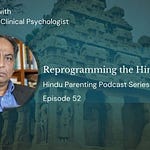
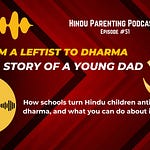
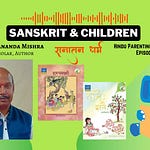

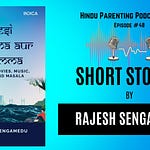
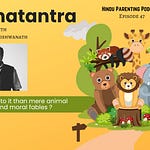
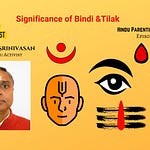

Share this post